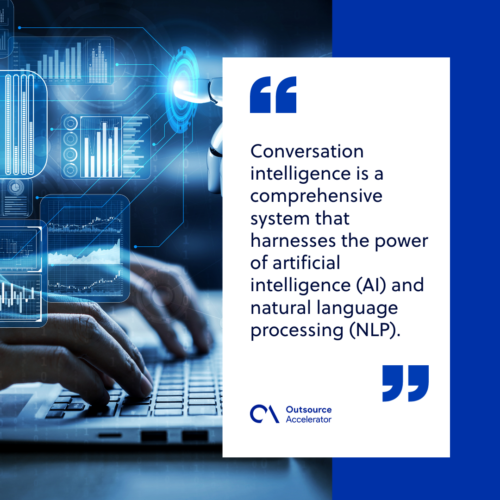Introducing conversation intelligence: Uses, benefits, and challenges

Ever wonder why businesses constantly seek innovative ways to gain a competitive edge in the global market?
It’s because competition in the modern marketplace is fierce and dynamic. Companies must adapt and differentiate themselves from their rivals to remain relevant and successful.
The connection of conversation intelligence in this matter is profound. Businesses can extract valuable insights from customer interactions, sales calls, and support conversations by harnessing conversation intelligence.
Let’s explore the importance of conversation intelligence, its benefits, and some key challenges.
What is conversation intelligence?
Conversation intelligence is a comprehensive system that harnesses the power of artificial intelligence (AI) and natural language processing (NLP). It analyzes and deciphers conversations across various communication platforms simultaneously.
Conversation intelligence goes beyond merely transcribing words and delves deep into the nuances of human language. It identifies patterns, sentiment, keywords, and context, refining conversations into actionable insights.

Uses of conversation intelligence
Conversation intelligence has a wide range of applications across various industries. Here are some key uses:
Sales performance analysis
For sales teams, conversation intelligence acts as a game-changer. It enables them to dissect customer interactions, identifying successful sales strategies and areas for improvement.
By analyzing conversations, sales professionals can pinpoint key trends, understand objections, and gauge customer sentiments.
This invaluable information contributes to a more informed approach, enhancing the conversion rate and overall sales performance.
Customer support optimization
Customer support teams benefit significantly from conversation intelligence. It serves as a watchful eye over customer interactions, offering insights into the quality of support provided.
By analyzing these interactions, businesses can identify common issues, recognize areas for improvement, and seize opportunities to elevate customer satisfaction.
It’s a means to ensure that customers receive the best support experience, ultimately fostering loyalty and positive brand perception.
Employee training and development
Conversation intelligence enables organizations to provide targeted feedback and coaching based on real customer interactions.
This enhances the effectiveness of training programs and instills confidence in employees as they better understand customer needs and expectations.
As a result, the workforce becomes more adept at delivering exceptional service.
Market research and insights
Market research is another area where conversation intelligence excels. It provides a window into market trends, customer preferences, and competitor analysis.
Through data mining from customer conversations, organizations gain valuable insights that shape marketing strategies, product development, and overall business decisions.
With conversation intelligence, data-driven decision-making becomes a powerful tool for staying competitive.

Voice of the customer analysis
In Voice of the Customer (VoC) analysis, conversation intelligence tools empower companies to listen to customer feedback and sentiment.
Businesses can make necessary adjustments to improve their products, services, and overall customer experience by analyzing customer interactions. This proactive approach fosters customer loyalty and strengthens the company’s reputation.
Benefits of conversation intelligence
Understanding the broader context of how this transformative technology can reshape business operations and strategy is essential.
Here are the significant benefits of conversation intelligence:
Enhanced customer satisfaction
By monitoring and analyzing customer interactions, conversation intelligence allows companies to better understand customer sentiments, preferences, and pain points.
This insight can lead to more personalized and effective customer interactions, resulting in higher satisfaction and increased customer loyalty.
Increased sales effectiveness
Conversation intelligence enables sales professionals to identify successful strategies, pinpoint objections, and uncover customer trends. This leads to more effective sales approaches, higher conversion rates, and revenue growth.
Streamlined compliance
In industries where regulatory compliance is crucial, conversation intelligence serves as a vigilant compliance monitor. It can automatically flag conversations that may raise compliance concerns.
This approach reduces legal risks and ensures that the organization adheres to industry regulations.
Challenges of conversation intelligence
While conversation intelligence offers numerous advantages, it also comes with challenges:
Data privacy concerns and compliance
One of the primary challenges associated with conversation intelligence is navigating data privacy concerns. It must also ensure compliance with regulations like GDPR (General Data Protection Regulation).
As conversation intelligence tools process and analyze conversations, they often involve sensitive customer data. This raises significant privacy considerations.
Organizations using this technology must diligently safeguard customer information, obtain consent when necessary, and adhere to data protection laws.
Failure to do so can result in legal consequences, financial penalties, and damage to an organization’s reputation.
Ensuring accuracy and reliability
While AI-driven analyses are a key feature of conversation intelligence, ensuring the accuracy and reliability of these analyses can be a complex challenge.
Inaccurate analyses can lead to misguided decisions, affecting customer experiences and overall business outcomes.
As such, the algorithms and models used for interpretation must continually evolve to account for changing language patterns and nuances.
Initial implementation costs and resource allocation
Adopting conversation intelligence involves initial implementation costs in terms of technology infrastructure and human resources.
Organizations must allocate resources for the following initiatives:
- Selecting and deploying suitable conversation intelligence tools
- Training employees to use conversation intelligence tools effectively
- Maintaining the technology over time
These upfront expenses can be a barrier for smaller businesses or those with limited budgets.
However, the long-term benefits, including improved customer experiences and operational efficiency, often outweigh these initial investments.
Conversation intelligence improves internal efficiency
Conversation intelligence is a transformative technology that transcends industries and business functions.
It equips organizations to harness the power of their interactions, leading to improved decision-making, heightened customer satisfaction, and increased sales effectiveness.

These benefits collectively contribute to enhanced operational efficiency and achieving strategic business objectives.







 Independent
Independent




